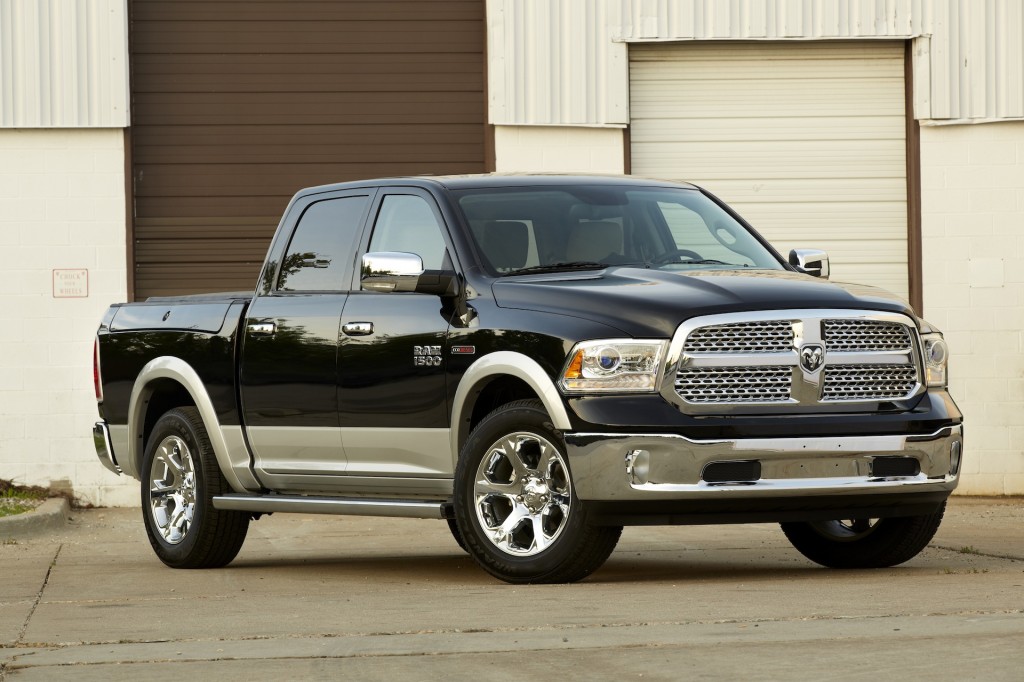Once in a while, we're blind-sided by responses to an article we publish--and we learn something in the process.
On December 23, we wrote about ways that the all-new 2015 Ford F-150 full-size pickup truck might get better gas mileage.
We learned that at least some of our readers seem to resent the very existence of full-size pickup trucks, and seemingly wish they would all just go away forever.
MORE: 2014 Pickup Truck Gas Mileage: Ford vs Chevy vs Ram, Who's Best?
More than that, a couple of readers attacked the site itself for simply writing about pickup trucks.
"Why in the world does something calling itself Green Car Reports do stories on things like Ford F-150s?" asked reader Lee Morrison on our Facebook page. "Are you subsidized by Big Oil?"

2014 Ram 1500 EcoDiesel
No, we're not. (Though our life would likely be far more lucrative and comfortable if we were.)
Here's how we responded:
You asked why we cover the Ford F-150. The answer is that it's the most popular single vehicle in the U.S. market, and will sell something like 650,000 units this year
We cover green technologies, improvements to fuel efficiency, alternative powertrains, and the associated energy-policy issues for all classes of vehicles--not just those with the very highest fuel efficiency (or plug-in and natural-gas vehicles, which don't use gasoline or diesel fuel at all).
We've encountered readers before who think that any vehicle below some arbitrary efficiency level--from 20 mpg to 50 mpg--should be utterly ignored.
We don't agree: Instead, we cover the ways that ALL vehicles are getting more efficient.
As for the notion that simply *mentioning* a car on this site amounts to "greenwashing," Google's first definition is: "disinformation disseminated by an organization so as to present an environmentally responsible public image."
2014 Chevrolet Silverado 1500 LTZ
We struggle to understand how writing about the future improvements in the F-150's fuel efficiency would be greenwashing.
Please identify for us what statements in the article are (a) untrue; (b) slanted so as to present the facts in a more favorable light than they deserve; or (c) more favorable to Ford and the F-150 than we've been to any other full-size truck.
Every vehicle has to get more efficient to meet increasingly stringent corporate average fuel economy (CAFE) rules from now through 2025.
We will see more plug-in hybrids and battery electric vehicles; we may see more passenger diesel vehicles; and some classes of vehicle may increase the use of natural gas. Meanwhile, gasoline use has fallen in the U.S. since 2007 and will continue to do so.
It strikes us that there are some readers who simply resent the existence of full-size pickup trucks and wish they would go away. And that's simply not going to happen.
Instead, they'll get more fuel-efficient--and we hope to be there, covering the topic, for years to come.

2014 Ford F-150 2WD SuperCrew 145
In thinking further, we'd suggest three more factors that may be at play:
(1) An improvement from 18 mpg to 22 mpg sounds insignificant--even though increasing fuel economy from 18 mpg to 22 mpg saves as much gasoline (1.01 gallons per 100 miles) as increasing a 33-mpg vehicle to 50 mpg (1 gallon per 100 miles).
(2) Many pickup trucks--like other vehicles on the roads--are used mostly by a single person, whose commute could just as easily take place in a 50-mpg Prius.
(3) Today's pickup trucks are far taller than trucks of the past, with styling designed to intimidate, which makes other drivers react with hostility--and that spills over into the discussion of gas mileage.
Let's be clear: We're going to continue to write about the fuel efficiency (or lack thereof) of all categories of vehicles, large pickups included.
Still, we're curious to know what more readers think about pickup trucks and our coverage of them.
Was our response fair? Do you side with readers who view any coverage of pickups as so-called greenwashing? Or is the answer perhaps somewhere in the middle?
Leave us your thoughts in the Comments below.
_______________________________________________













